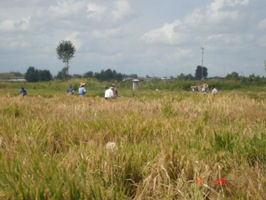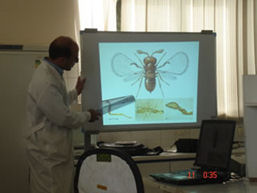|
Sustainable agro-ecosystem management through participatory integrated crop production & protection of rice fields
Grant MSGPV-IR10-05
 |
By the advent of the Green Revolution, pesticides became the dominant
approach to plant protection in many other countries including Iran. This approach has not only failed to protect
the crops in the past 60 years, but also has led to many negative impacts, such as pest breakouts and threats to
the human health and environment. The more pesticides used, the more farmlands had to be sprayed. In some provinces,
where the intensity of agriculture is quite high, there is a very dangerous concentration of pesticides. About 60
percent of the total pesticides sprayed in Iran, are used only in the 3 Iranian Caspian coastal provinces. About 26,000
tons of different pesticides are distributed between the farmers each year. Also, substantial amounts of pesticides are
imported illegally, some of which are included in the list of banned chemicals. A similar spraying intensity occurs for
certain fruits and vegetables, in particular in summer crops and greenhouses, where the number of applications is as
high as 6-12 times a season. Since 1994, the Government of Iran has started a number of programs to reduce the use of
pesticides. But many of them are not sustained, mainly due to the fact that they did not fully incorporate bottom-up
participatory approaches and the relevant stakeholders failed to set in place an appropriate model for sustainable
plant management at the farm level.
 |
The objective of this project is to introduce the Farmers Field School (FFS)
approach to the rice paddy fields in Iranian Caspian Provinces. This method is quite effective in empowering the
farmers to tackle many of their problems, reduce the costs of production and to increase incomes. Currently, 15
FFSs are established and the ongoing on site trainings are raising the awareness of the farmers on the risks involved
with the application of harmful pesticides and thus could eliminate or drastically reduce their usage by introducing
biological and endemic methods of combating pests. The farmers are learning how to analyse their own farms and
consider their options for the management of their fields and enhancement of their crop production.
Project Budget: 88,000 USD
Total Grant: 43,000 USD
|
